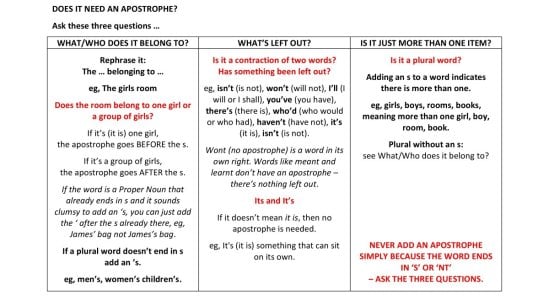SDC Rewards Member
Upgrade yours now
Learning grammar is just as important as it always was but the way we teach it has changed
Many students are returning to school this year face a renewed focus on grammar. Just before Christmas, the NSW curriculum was overhauled to include the “explicit teaching of grammar, sentence structure and punctuation in high school”.
This comes amid concerns about literacy levels, particularly among teenage boys. Last month, a major Productivity Commission report on schools also criticised nationwide literacy (and numeracy) standards.
With so many online tools now available to help us write, why is grammar still important?
What is grammar?
Grammar is the backbone of any language. We use the rules of grammar to structure words into sentences and sentences into longer speech and writing others can understand us.Examples of grammatical rules in English are locating an adjective before the noun to which it refers, and using “who” to refer to previously-mentioned human subjects in a sentence.
There is no universal system of grammar rules. For example, in French, adjectives usually follow the noun to which they refer, and it forms the future tense differently from English. Grammar rules are only useful when all users of the language know how to use them.
In English you can also express the one idea in several different ways. Suppose you want to tell someone about an event. You could say “Bill pushed Tom”, “Tom was pushed by Bill”, “It was Bill who pushed Tom”, or “Bill pushed Tom, didn’t he?” These examples differ in the grammatical rules they use.
The actual grammatical rules we use at any time depend on the social context. How we talk about an idea with colleagues may differ from how we talk about the same idea at home. We also write and speak in different ways.
Does it matter?
Many older people will recall being explicitly taught grammar at school. But this fell out of fashion because it was judged to be relatively ineffective in enhancing the use of grammar in spoken or written communication.You may believe that with AI tools – such as writing assistant Grammarly – and computers, we don’t need to learn grammar.
But learning grammar is as important as it always was. To use grammar, the rules need to be in our brains, not in our hands. Devices can assist our brains but not replace them.
Without grammar, it is hard to communicate effectively. We might, for example, recognise individual words in what someone says but we would be less able to understand the links between them.
Research suggests children’s grammar predicts their reading comprehension later. For example, grammatical knowledge at four years of age predicts reading comprehension two years later. It also affectschildren’s social competence, self-confidence and identity, because it helps them see that they can communicate meaningfully and get positive feedback for what they say.
How do children learn it?
We can learn grammar both by immersion and by explicit teaching, that is, simply by experiencing its use in specific situations and by specific instruction.Young children learn grammatical knowledge gradually. Most children begin to say and understand strings of two and three words around the age of two, without specific teaching. They learn it by being exposed to language in their everyday environment.
The speech they hear is usually accompanied by meaningful actions in particular events. For example, they hear “more milk?” when milk is being offered. The actions help them learn how to fit the language to the meaning or function.
What they say and understand shows they can use grammatical rules or patterns. However, they are usually unable to say precisely what these rules are.
Some linguists believe immersion works because the human brain has an innate capacity to learn language.
Gradually children learn more complex grammatical structures. Older children and adults may not become aware of the explicit rules of grammar – and this isn’t necessary to use them.
How can you teach it?
Many readers may have been taught grammar by analysing random sentences into their component parts. At school, you may have had to identify the nouns or adverbs and to arrange them accordingly.But this approach had little impact on literacy or oral language development.
There are lots of different ways to teach grammar but effective teaching today uses the following techniques:
- it takes account of the grammatical patterns and rules the child already uses
- it introduces grammatical rules in specific contexts or events that are meaningful for the child. If you are teaching the passive voice, and using the example of the “cat chased the dog” show a picture of a picture of where a cat chases a dog
- acting out sentences using a new rule as the first step in learning the new rule
- arranging a set of words into sentence using the new rule
- helping the student use the new rule in their everyday speech and writing to show they understand it.
The aim is to teach both the rules and to help students use them in their everyday communication.
If you want to help your child with grammar, talk to your child’s teacher. They can direct you to most appropriate materials (there are plenty online) that are relevant to what your child already knows and work with what is being done at school.
This article was first published on The Conversation, and was written by John Munro, Professor, Faculty of Education and Arts, Australian Catholic University








